Expatriate Training: Management Development Proposal for Fit 4 Life
VerifiedAdded on 2022/01/17
|10
|1364
|38
Report
AI Summary
This report examines the importance of expatriate training for both individual expatriates and the organizations they represent, emphasizing its role in facilitating smoother transitions and fostering cultural sensitivity. It highlights how training equips employees and their families with the necessary skills to interact effectively across cultures and adapt to new working and living environments. The report also stresses that well-trained expatriates possess essential information about their host country, which nurtures skills crucial for success in unfamiliar surroundings. Furthermore, the document includes a detailed 3-day training proposal for newly recruited managers at Fit 4 Life, focusing on stress management, building successful work relationships in Italian settings, and providing effective performance feedback. The training program aims to equip managers with the tools necessary to navigate cultural differences and create a conducive work environment.
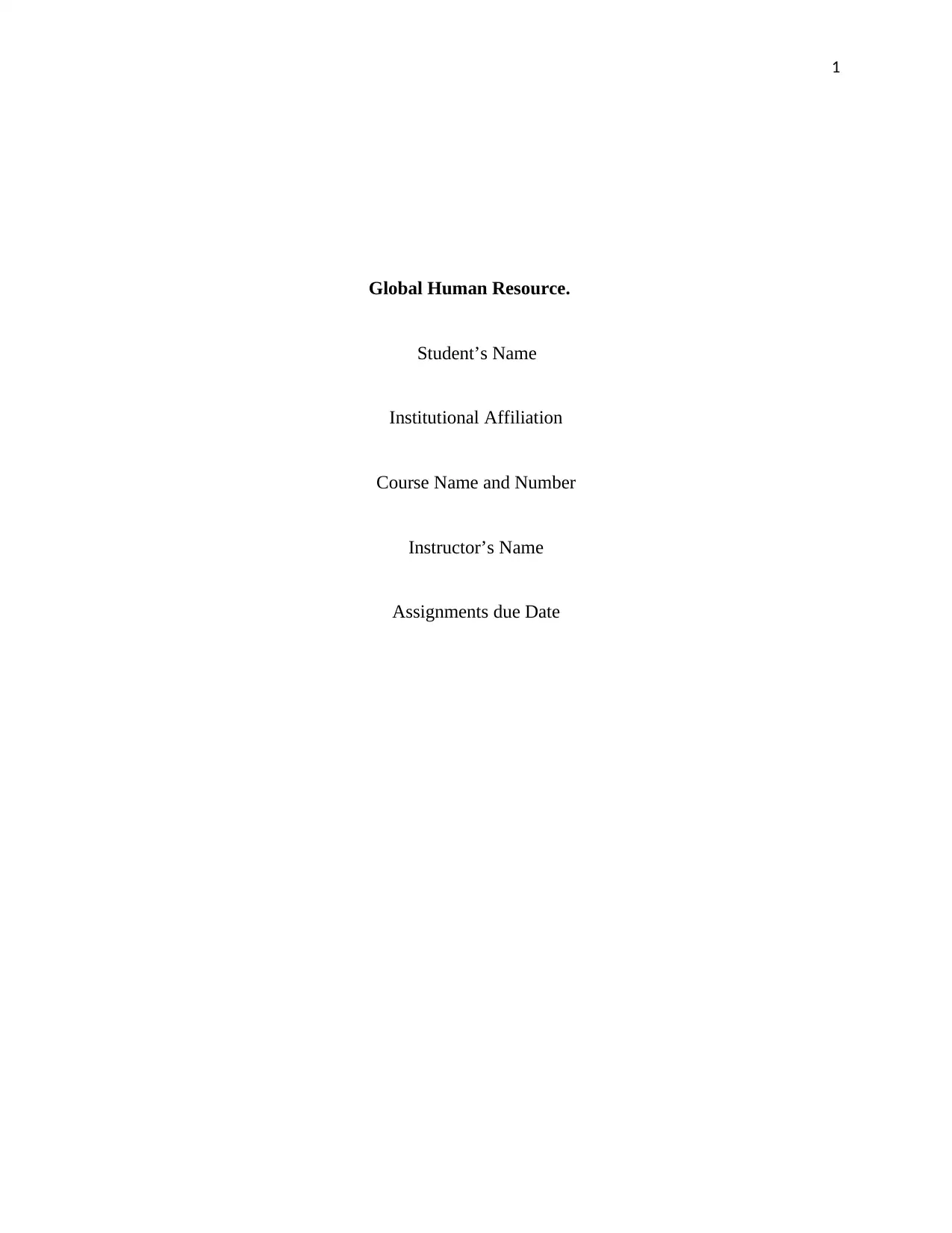
1
Global Human Resource.
Student’s Name
Institutional Affiliation
Course Name and Number
Instructor’s Name
Assignments due Date
Global Human Resource.
Student’s Name
Institutional Affiliation
Course Name and Number
Instructor’s Name
Assignments due Date
Paraphrase This Document
Need a fresh take? Get an instant paraphrase of this document with our AI Paraphraser
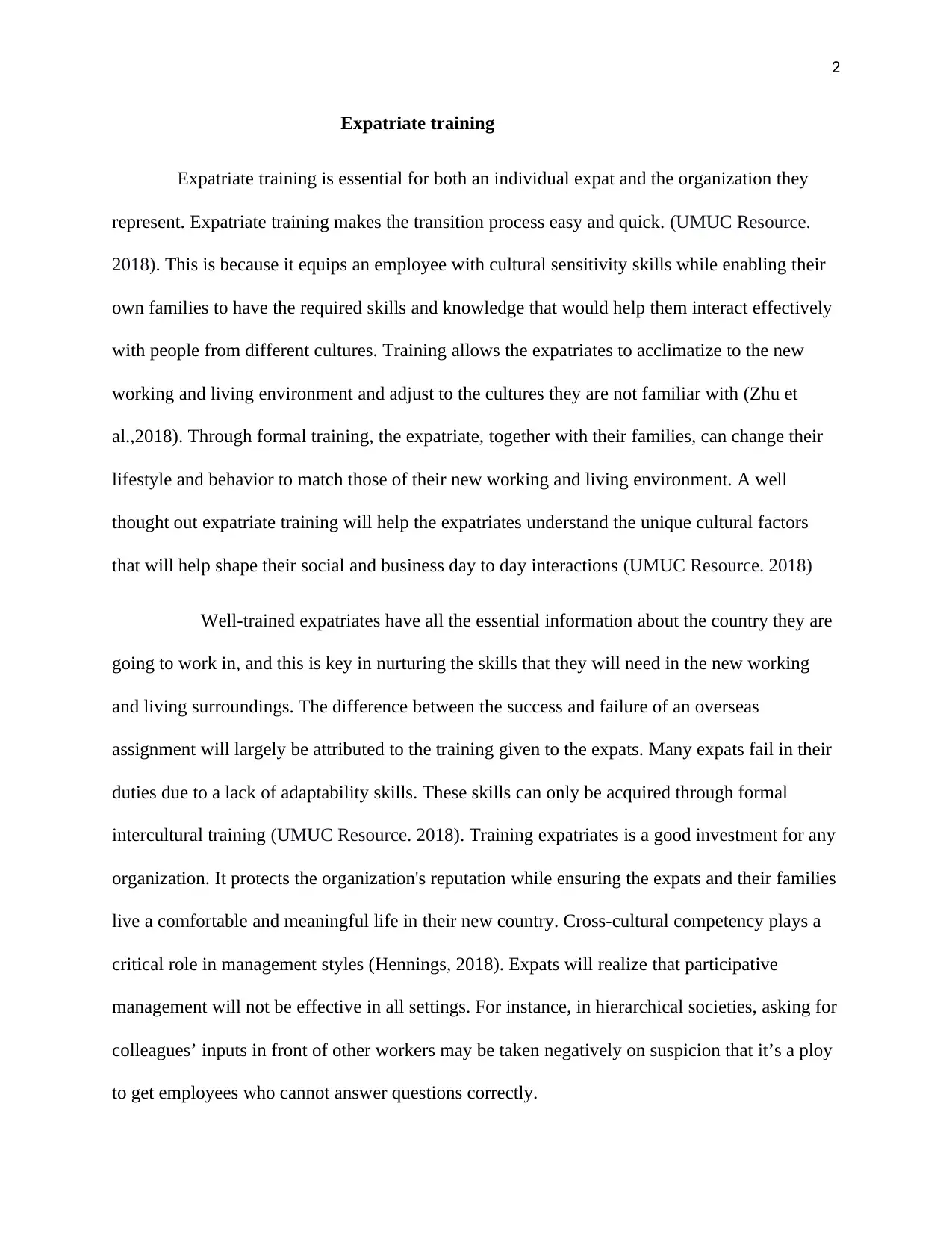
2
Expatriate training
Expatriate training is essential for both an individual expat and the organization they
represent. Expatriate training makes the transition process easy and quick. (UMUC Resource.
2018). This is because it equips an employee with cultural sensitivity skills while enabling their
own families to have the required skills and knowledge that would help them interact effectively
with people from different cultures. Training allows the expatriates to acclimatize to the new
working and living environment and adjust to the cultures they are not familiar with (Zhu et
al.,2018). Through formal training, the expatriate, together with their families, can change their
lifestyle and behavior to match those of their new working and living environment. A well
thought out expatriate training will help the expatriates understand the unique cultural factors
that will help shape their social and business day to day interactions (UMUC Resource. 2018)
Well-trained expatriates have all the essential information about the country they are
going to work in, and this is key in nurturing the skills that they will need in the new working
and living surroundings. The difference between the success and failure of an overseas
assignment will largely be attributed to the training given to the expats. Many expats fail in their
duties due to a lack of adaptability skills. These skills can only be acquired through formal
intercultural training (UMUC Resource. 2018). Training expatriates is a good investment for any
organization. It protects the organization's reputation while ensuring the expats and their families
live a comfortable and meaningful life in their new country. Cross-cultural competency plays a
critical role in management styles (Hennings, 2018). Expats will realize that participative
management will not be effective in all settings. For instance, in hierarchical societies, asking for
colleagues’ inputs in front of other workers may be taken negatively on suspicion that it’s a ploy
to get employees who cannot answer questions correctly.
Expatriate training
Expatriate training is essential for both an individual expat and the organization they
represent. Expatriate training makes the transition process easy and quick. (UMUC Resource.
2018). This is because it equips an employee with cultural sensitivity skills while enabling their
own families to have the required skills and knowledge that would help them interact effectively
with people from different cultures. Training allows the expatriates to acclimatize to the new
working and living environment and adjust to the cultures they are not familiar with (Zhu et
al.,2018). Through formal training, the expatriate, together with their families, can change their
lifestyle and behavior to match those of their new working and living environment. A well
thought out expatriate training will help the expatriates understand the unique cultural factors
that will help shape their social and business day to day interactions (UMUC Resource. 2018)
Well-trained expatriates have all the essential information about the country they are
going to work in, and this is key in nurturing the skills that they will need in the new working
and living surroundings. The difference between the success and failure of an overseas
assignment will largely be attributed to the training given to the expats. Many expats fail in their
duties due to a lack of adaptability skills. These skills can only be acquired through formal
intercultural training (UMUC Resource. 2018). Training expatriates is a good investment for any
organization. It protects the organization's reputation while ensuring the expats and their families
live a comfortable and meaningful life in their new country. Cross-cultural competency plays a
critical role in management styles (Hennings, 2018). Expats will realize that participative
management will not be effective in all settings. For instance, in hierarchical societies, asking for
colleagues’ inputs in front of other workers may be taken negatively on suspicion that it’s a ploy
to get employees who cannot answer questions correctly.
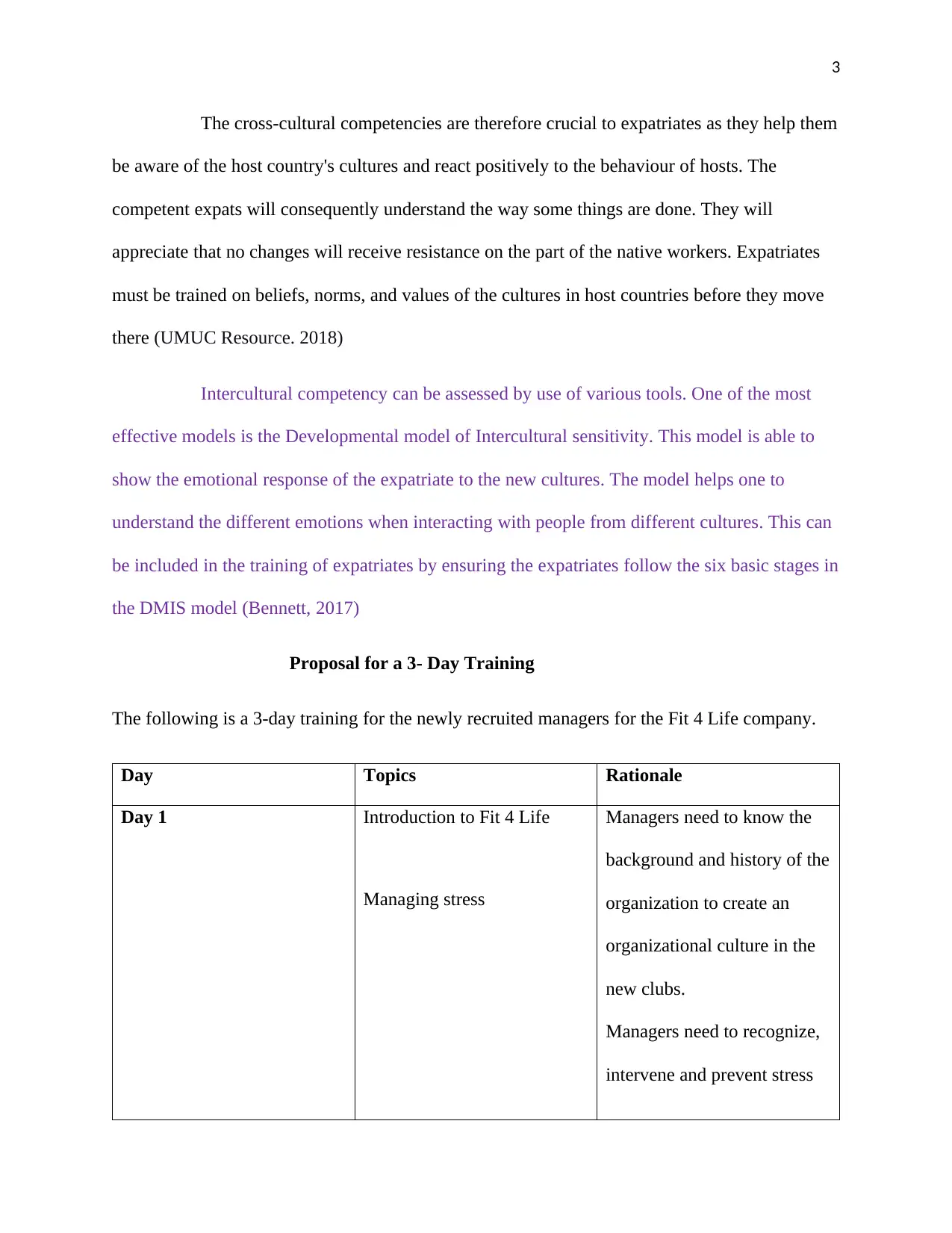
3
The cross-cultural competencies are therefore crucial to expatriates as they help them
be aware of the host country's cultures and react positively to the behaviour of hosts. The
competent expats will consequently understand the way some things are done. They will
appreciate that no changes will receive resistance on the part of the native workers. Expatriates
must be trained on beliefs, norms, and values of the cultures in host countries before they move
there (UMUC Resource. 2018)
Intercultural competency can be assessed by use of various tools. One of the most
effective models is the Developmental model of Intercultural sensitivity. This model is able to
show the emotional response of the expatriate to the new cultures. The model helps one to
understand the different emotions when interacting with people from different cultures. This can
be included in the training of expatriates by ensuring the expatriates follow the six basic stages in
the DMIS model (Bennett, 2017)
Proposal for a 3- Day Training
The following is a 3-day training for the newly recruited managers for the Fit 4 Life company.
Day Topics Rationale
Day 1 Introduction to Fit 4 Life
Managing stress
Managers need to know the
background and history of the
organization to create an
organizational culture in the
new clubs.
Managers need to recognize,
intervene and prevent stress
The cross-cultural competencies are therefore crucial to expatriates as they help them
be aware of the host country's cultures and react positively to the behaviour of hosts. The
competent expats will consequently understand the way some things are done. They will
appreciate that no changes will receive resistance on the part of the native workers. Expatriates
must be trained on beliefs, norms, and values of the cultures in host countries before they move
there (UMUC Resource. 2018)
Intercultural competency can be assessed by use of various tools. One of the most
effective models is the Developmental model of Intercultural sensitivity. This model is able to
show the emotional response of the expatriate to the new cultures. The model helps one to
understand the different emotions when interacting with people from different cultures. This can
be included in the training of expatriates by ensuring the expatriates follow the six basic stages in
the DMIS model (Bennett, 2017)
Proposal for a 3- Day Training
The following is a 3-day training for the newly recruited managers for the Fit 4 Life company.
Day Topics Rationale
Day 1 Introduction to Fit 4 Life
Managing stress
Managers need to know the
background and history of the
organization to create an
organizational culture in the
new clubs.
Managers need to recognize,
intervene and prevent stress
⊘ This is a preview!⊘
Do you want full access?
Subscribe today to unlock all pages.

Trusted by 1+ million students worldwide
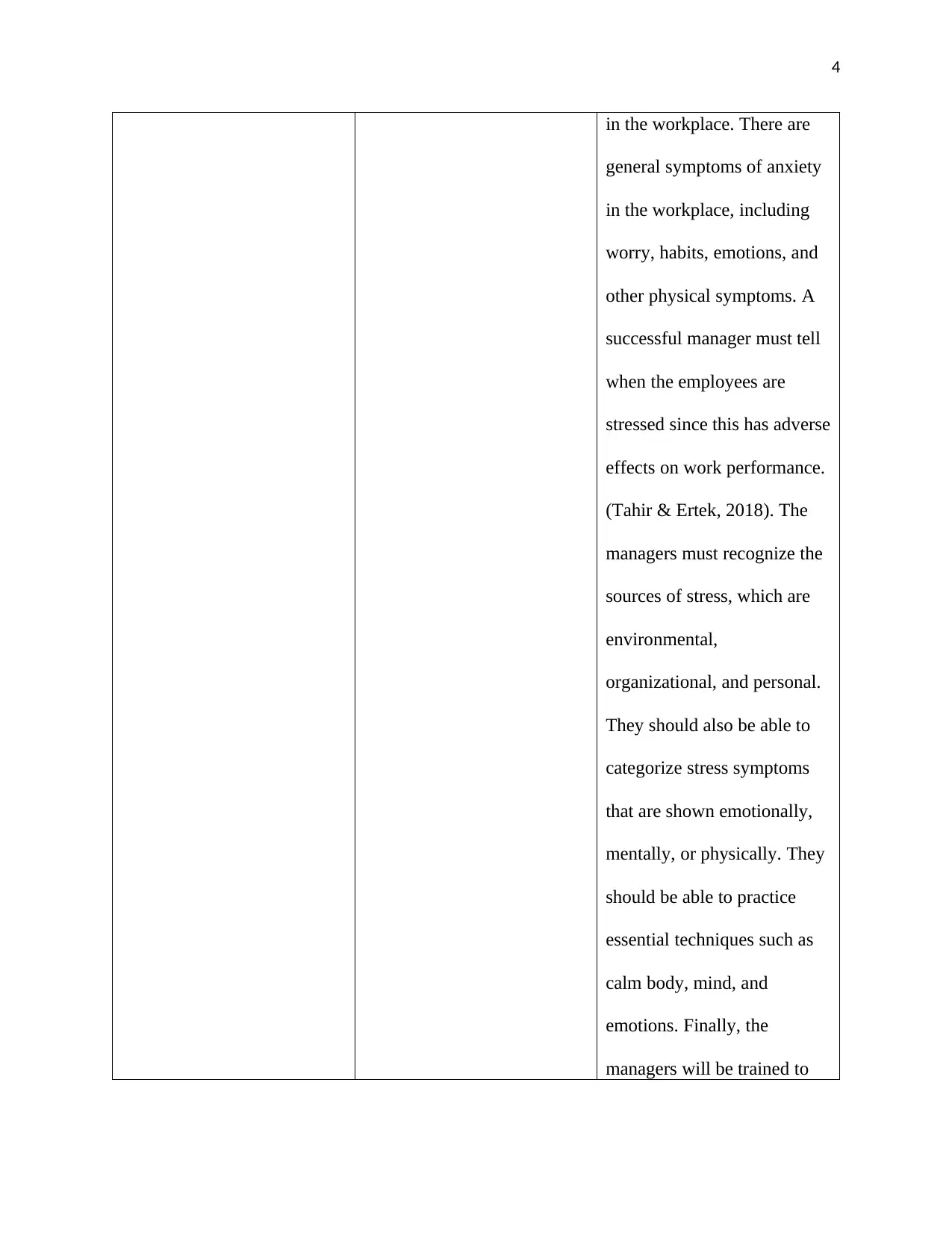
4
in the workplace. There are
general symptoms of anxiety
in the workplace, including
worry, habits, emotions, and
other physical symptoms. A
successful manager must tell
when the employees are
stressed since this has adverse
effects on work performance.
(Tahir & Ertek, 2018). The
managers must recognize the
sources of stress, which are
environmental,
organizational, and personal.
They should also be able to
categorize stress symptoms
that are shown emotionally,
mentally, or physically. They
should be able to practice
essential techniques such as
calm body, mind, and
emotions. Finally, the
managers will be trained to
in the workplace. There are
general symptoms of anxiety
in the workplace, including
worry, habits, emotions, and
other physical symptoms. A
successful manager must tell
when the employees are
stressed since this has adverse
effects on work performance.
(Tahir & Ertek, 2018). The
managers must recognize the
sources of stress, which are
environmental,
organizational, and personal.
They should also be able to
categorize stress symptoms
that are shown emotionally,
mentally, or physically. They
should be able to practice
essential techniques such as
calm body, mind, and
emotions. Finally, the
managers will be trained to
Paraphrase This Document
Need a fresh take? Get an instant paraphrase of this document with our AI Paraphraser
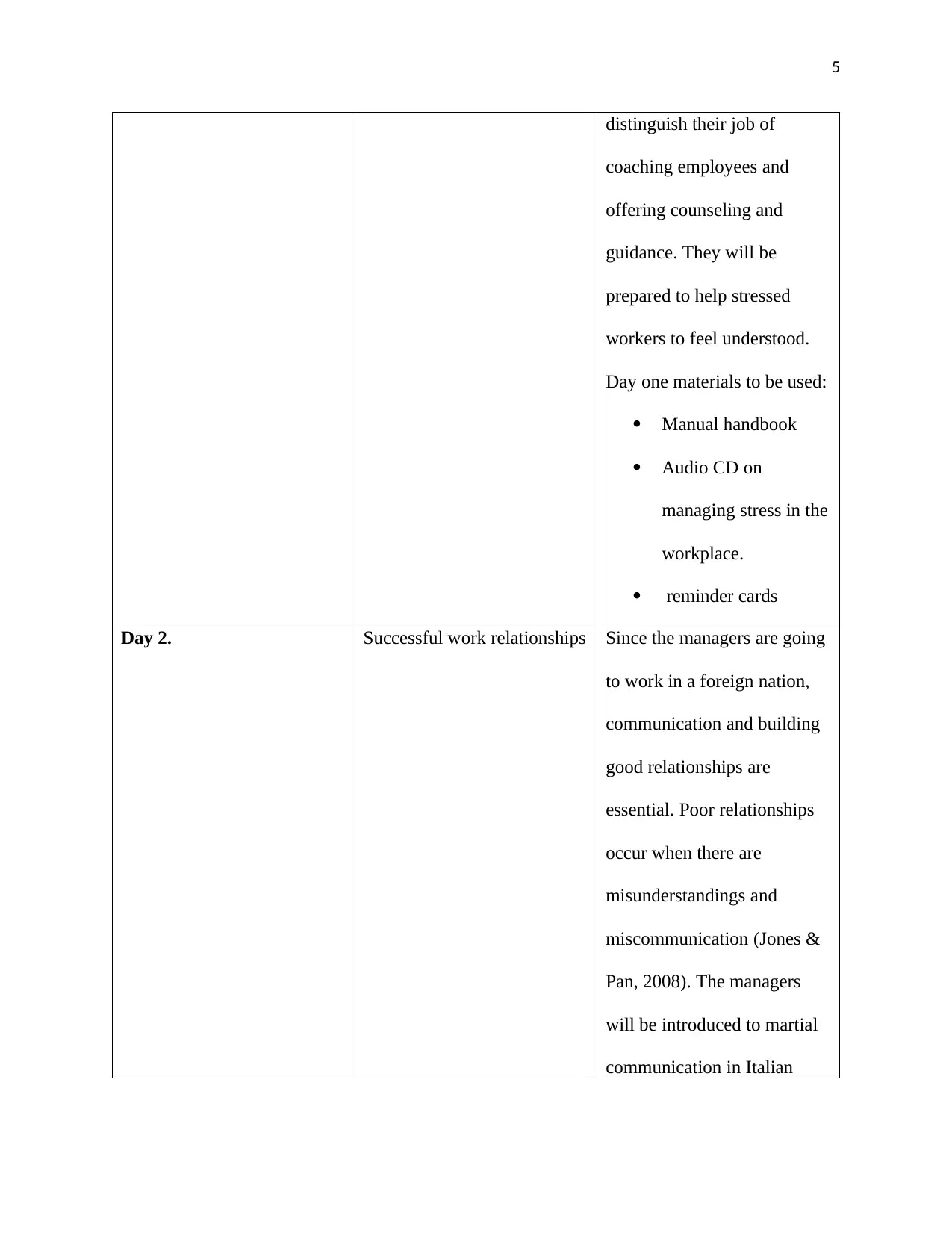
5
distinguish their job of
coaching employees and
offering counseling and
guidance. They will be
prepared to help stressed
workers to feel understood.
Day one materials to be used:
Manual handbook
Audio CD on
managing stress in the
workplace.
reminder cards
Day 2. Successful work relationships Since the managers are going
to work in a foreign nation,
communication and building
good relationships are
essential. Poor relationships
occur when there are
misunderstandings and
miscommunication (Jones &
Pan, 2008). The managers
will be introduced to martial
communication in Italian
distinguish their job of
coaching employees and
offering counseling and
guidance. They will be
prepared to help stressed
workers to feel understood.
Day one materials to be used:
Manual handbook
Audio CD on
managing stress in the
workplace.
reminder cards
Day 2. Successful work relationships Since the managers are going
to work in a foreign nation,
communication and building
good relationships are
essential. Poor relationships
occur when there are
misunderstandings and
miscommunication (Jones &
Pan, 2008). The managers
will be introduced to martial
communication in Italian
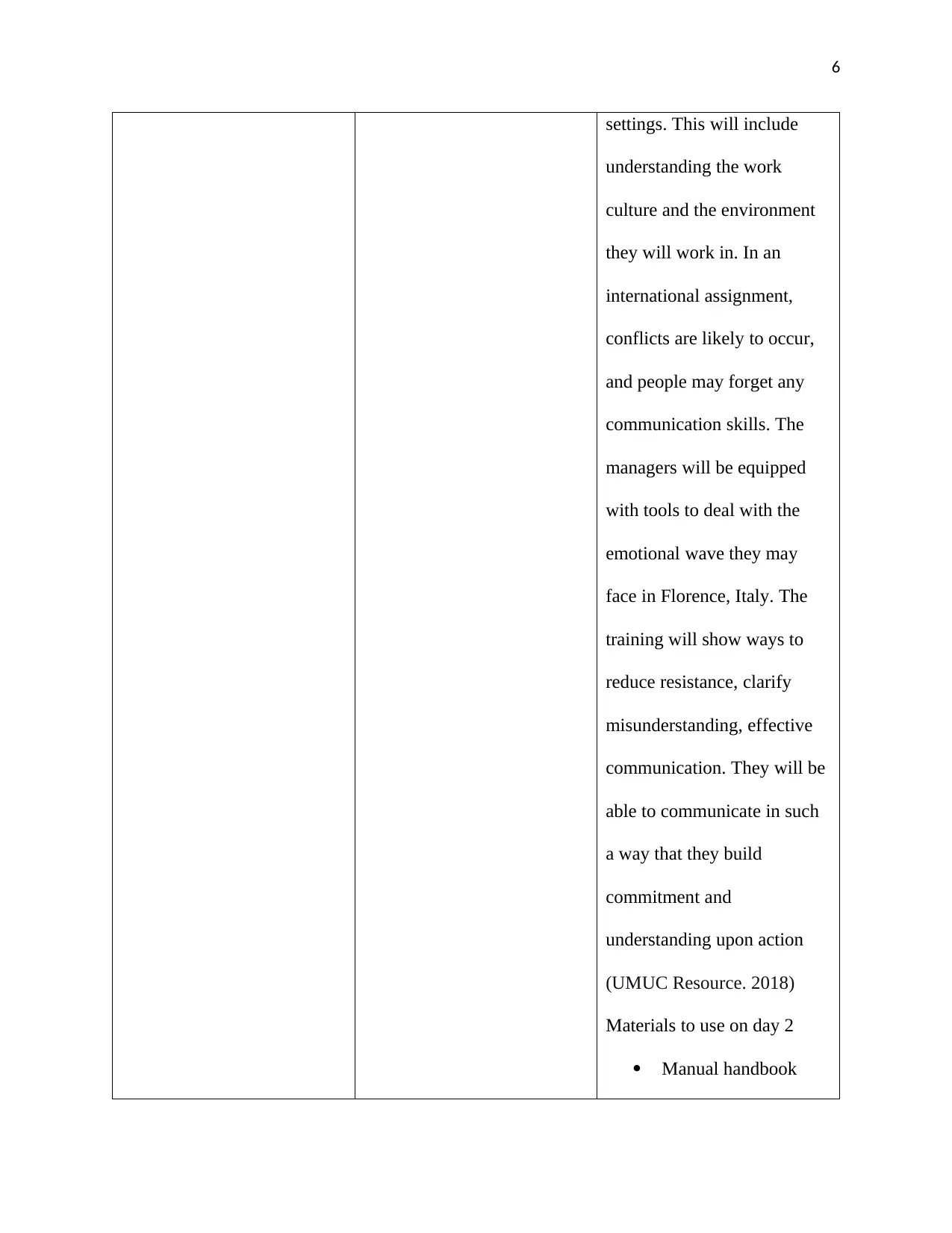
6
settings. This will include
understanding the work
culture and the environment
they will work in. In an
international assignment,
conflicts are likely to occur,
and people may forget any
communication skills. The
managers will be equipped
with tools to deal with the
emotional wave they may
face in Florence, Italy. The
training will show ways to
reduce resistance, clarify
misunderstanding, effective
communication. They will be
able to communicate in such
a way that they build
commitment and
understanding upon action
(UMUC Resource. 2018)
Materials to use on day 2
Manual handbook
settings. This will include
understanding the work
culture and the environment
they will work in. In an
international assignment,
conflicts are likely to occur,
and people may forget any
communication skills. The
managers will be equipped
with tools to deal with the
emotional wave they may
face in Florence, Italy. The
training will show ways to
reduce resistance, clarify
misunderstanding, effective
communication. They will be
able to communicate in such
a way that they build
commitment and
understanding upon action
(UMUC Resource. 2018)
Materials to use on day 2
Manual handbook
⊘ This is a preview!⊘
Do you want full access?
Subscribe today to unlock all pages.

Trusted by 1+ million students worldwide
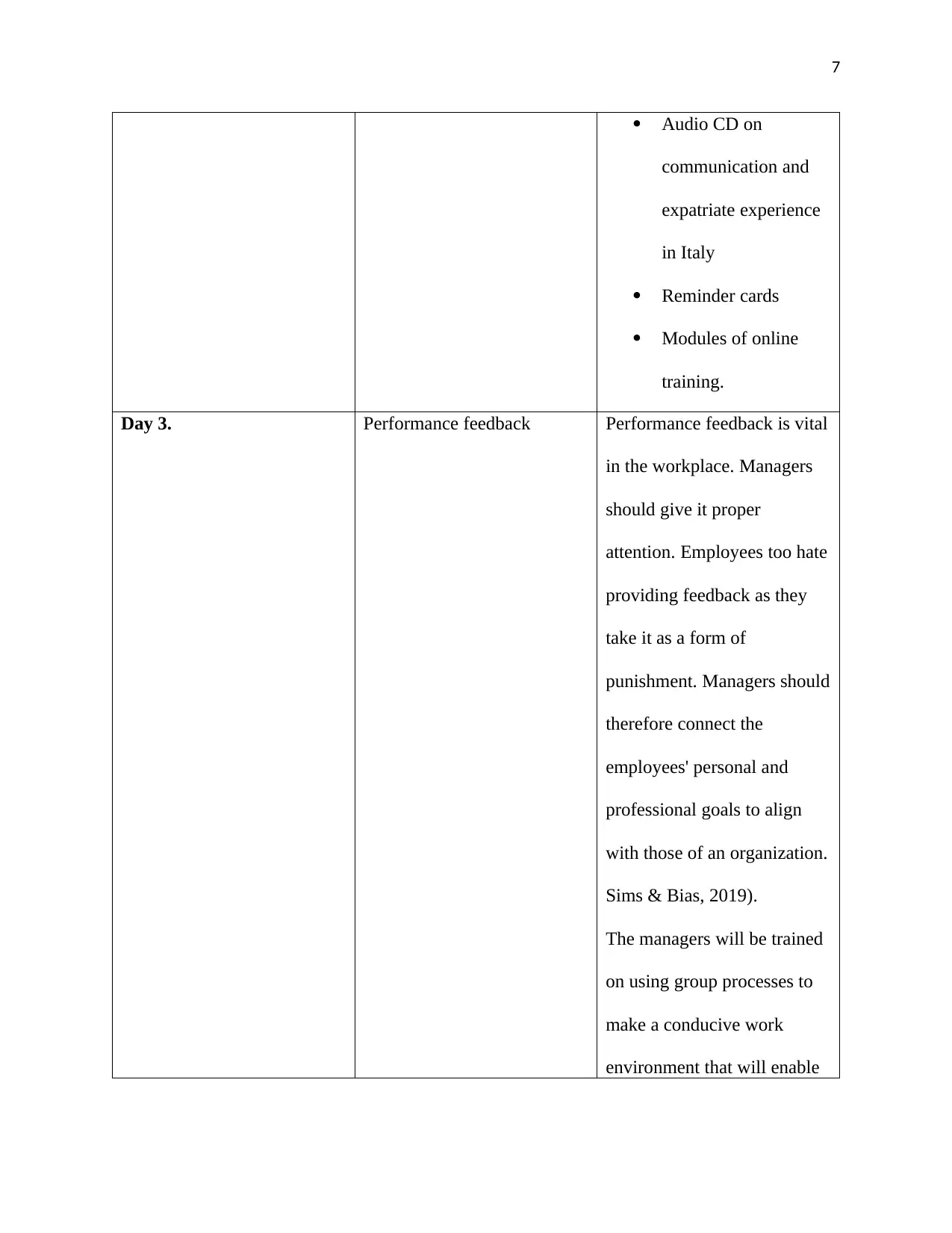
7
Audio CD on
communication and
expatriate experience
in Italy
Reminder cards
Modules of online
training.
Day 3. Performance feedback Performance feedback is vital
in the workplace. Managers
should give it proper
attention. Employees too hate
providing feedback as they
take it as a form of
punishment. Managers should
therefore connect the
employees' personal and
professional goals to align
with those of an organization.
Sims & Bias, 2019).
The managers will be trained
on using group processes to
make a conducive work
environment that will enable
Audio CD on
communication and
expatriate experience
in Italy
Reminder cards
Modules of online
training.
Day 3. Performance feedback Performance feedback is vital
in the workplace. Managers
should give it proper
attention. Employees too hate
providing feedback as they
take it as a form of
punishment. Managers should
therefore connect the
employees' personal and
professional goals to align
with those of an organization.
Sims & Bias, 2019).
The managers will be trained
on using group processes to
make a conducive work
environment that will enable
Paraphrase This Document
Need a fresh take? Get an instant paraphrase of this document with our AI Paraphraser
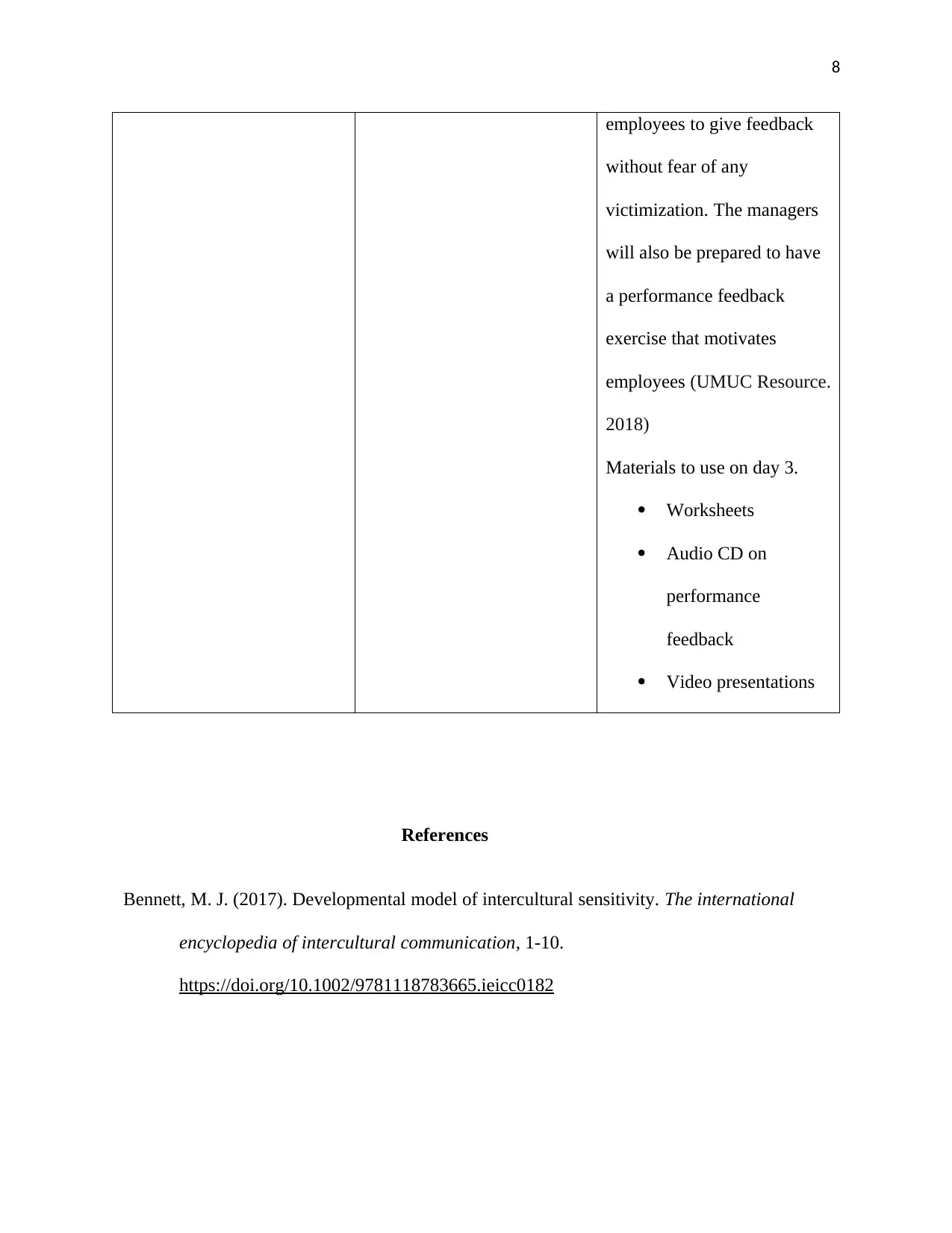
8
employees to give feedback
without fear of any
victimization. The managers
will also be prepared to have
a performance feedback
exercise that motivates
employees (UMUC Resource.
2018)
Materials to use on day 3.
Worksheets
Audio CD on
performance
feedback
Video presentations
References
Bennett, M. J. (2017). Developmental model of intercultural sensitivity. The international
encyclopedia of intercultural communication, 1-10.
https://doi.org/10.1002/9781118783665.ieicc0182
employees to give feedback
without fear of any
victimization. The managers
will also be prepared to have
a performance feedback
exercise that motivates
employees (UMUC Resource.
2018)
Materials to use on day 3.
Worksheets
Audio CD on
performance
feedback
Video presentations
References
Bennett, M. J. (2017). Developmental model of intercultural sensitivity. The international
encyclopedia of intercultural communication, 1-10.
https://doi.org/10.1002/9781118783665.ieicc0182
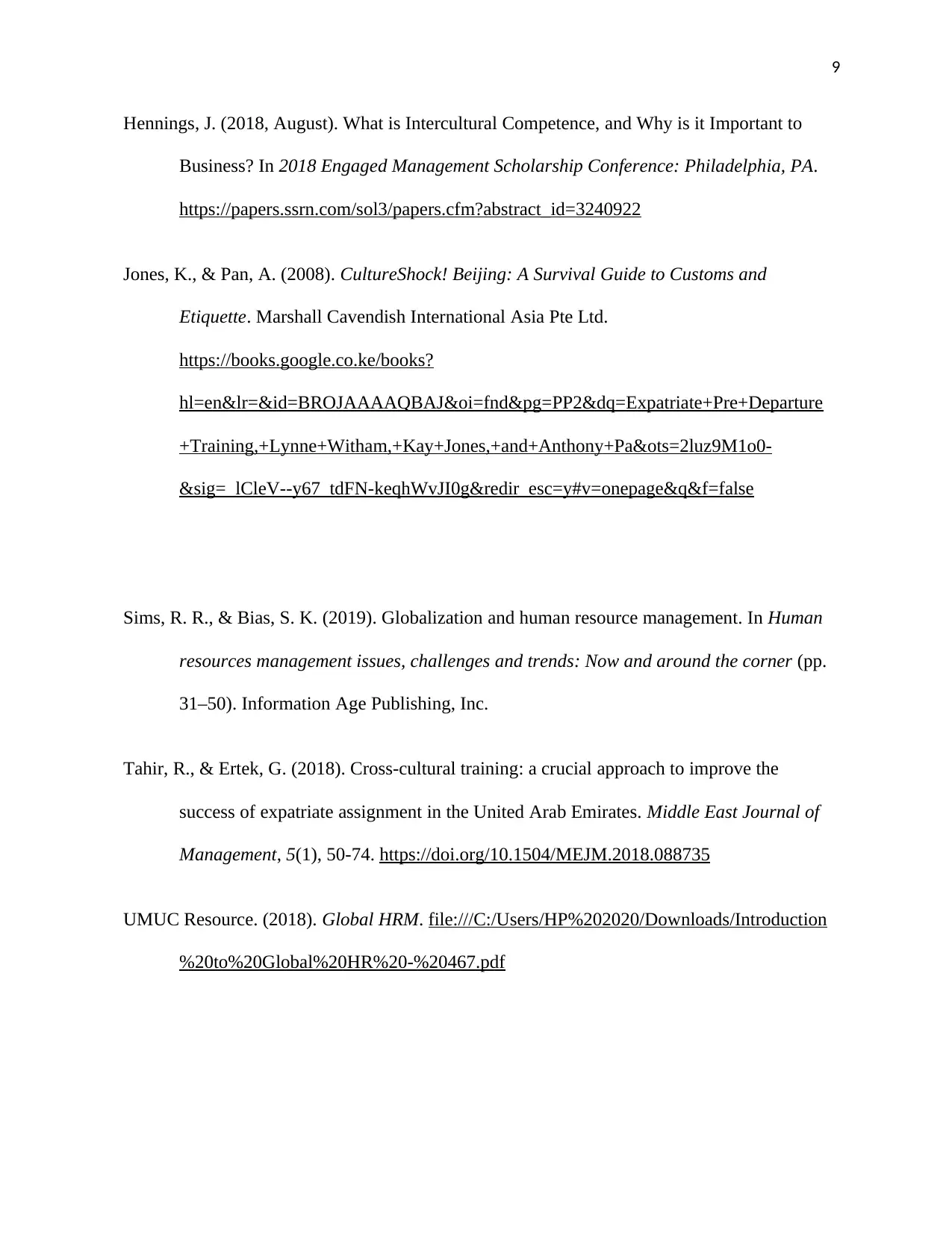
9
Hennings, J. (2018, August). What is Intercultural Competence, and Why is it Important to
Business? In 2018 Engaged Management Scholarship Conference: Philadelphia, PA.
https://papers.ssrn.com/sol3/papers.cfm?abstract_id=3240922
Jones, K., & Pan, A. (2008). CultureShock! Beijing: A Survival Guide to Customs and
Etiquette. Marshall Cavendish International Asia Pte Ltd.
https://books.google.co.ke/books?
hl=en&lr=&id=BROJAAAAQBAJ&oi=fnd&pg=PP2&dq=Expatriate+Pre+Departure
+Training,+Lynne+Witham,+Kay+Jones,+and+Anthony+Pa&ots=2luz9M1o0-
&sig=_lCleV--y67_tdFN-keqhWvJI0g&redir_esc=y#v=onepage&q&f=false
Sims, R. R., & Bias, S. K. (2019). Globalization and human resource management. In Human
resources management issues, challenges and trends: Now and around the corner (pp.
31–50). Information Age Publishing, Inc.
Tahir, R., & Ertek, G. (2018). Cross-cultural training: a crucial approach to improve the
success of expatriate assignment in the United Arab Emirates. Middle East Journal of
Management, 5(1), 50-74. https://doi.org/10.1504/MEJM.2018.088735
UMUC Resource. (2018). Global HRM. file:///C:/Users/HP%202020/Downloads/Introduction
%20to%20Global%20HR%20-%20467.pdf
Hennings, J. (2018, August). What is Intercultural Competence, and Why is it Important to
Business? In 2018 Engaged Management Scholarship Conference: Philadelphia, PA.
https://papers.ssrn.com/sol3/papers.cfm?abstract_id=3240922
Jones, K., & Pan, A. (2008). CultureShock! Beijing: A Survival Guide to Customs and
Etiquette. Marshall Cavendish International Asia Pte Ltd.
https://books.google.co.ke/books?
hl=en&lr=&id=BROJAAAAQBAJ&oi=fnd&pg=PP2&dq=Expatriate+Pre+Departure
+Training,+Lynne+Witham,+Kay+Jones,+and+Anthony+Pa&ots=2luz9M1o0-
&sig=_lCleV--y67_tdFN-keqhWvJI0g&redir_esc=y#v=onepage&q&f=false
Sims, R. R., & Bias, S. K. (2019). Globalization and human resource management. In Human
resources management issues, challenges and trends: Now and around the corner (pp.
31–50). Information Age Publishing, Inc.
Tahir, R., & Ertek, G. (2018). Cross-cultural training: a crucial approach to improve the
success of expatriate assignment in the United Arab Emirates. Middle East Journal of
Management, 5(1), 50-74. https://doi.org/10.1504/MEJM.2018.088735
UMUC Resource. (2018). Global HRM. file:///C:/Users/HP%202020/Downloads/Introduction
%20to%20Global%20HR%20-%20467.pdf
⊘ This is a preview!⊘
Do you want full access?
Subscribe today to unlock all pages.

Trusted by 1+ million students worldwide

10
Zhu, C. J., De Cieri, H., Fan, D., & Mike Zhang, M. (2018). Expatriate management in
emerging market multinational enterprises (EMNEs): reflection and future research
agenda. https://doi.org/10.1080/09585192.2017.1335997
Zhu, C. J., De Cieri, H., Fan, D., & Mike Zhang, M. (2018). Expatriate management in
emerging market multinational enterprises (EMNEs): reflection and future research
agenda. https://doi.org/10.1080/09585192.2017.1335997
1 out of 10
Related Documents
Your All-in-One AI-Powered Toolkit for Academic Success.
+13062052269
info@desklib.com
Available 24*7 on WhatsApp / Email
![[object Object]](/_next/static/media/star-bottom.7253800d.svg)
Unlock your academic potential
Copyright © 2020–2026 A2Z Services. All Rights Reserved. Developed and managed by ZUCOL.




